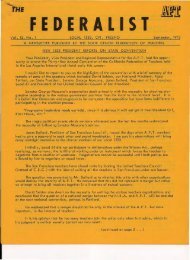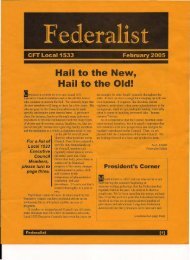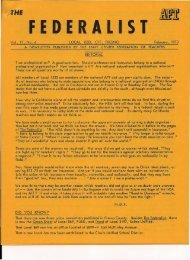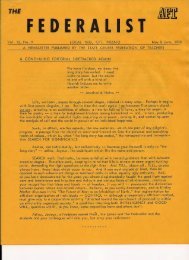Federalist 1983.9 - SCFT Local 1533
Federalist 1983.9 - SCFT Local 1533
Federalist 1983.9 - SCFT Local 1533
Create successful ePaper yourself
Turn your PDF publications into a flip-book with our unique Google optimized e-Paper software.
The American Federation of Teachers and its many localsto watchdog educational standards and teachers' rights.are examples of the union's efforts in these regards.continueBelowBy STACY Eo PALMERWASHINGTONCollege teachers are not expectedto be significantly affected by a recentSupreme Court ruling that publicemployees who complain abouttheir working conditions are not protectedby the First Amendment'sguarantee of free speech.The 5-t0-4 decision came in a caseinvolving charges by a New Orleansassistant district attorney. SheilaMyers, that her constitutional rightswere violated when she was fired immediatelyafter distributing a questionnaireabout office practices to hercoworkers.Faculty-union leaders questionedby The Chronicle-last week said that,while they were disappointed by theIruling, they did not think it wouldcurtail teachers' rights to speak outon matters of public policy.Several labor groups, including theNational Education Association andthe American F,eda5tiop of Teachers(A.F.L.~.Q.), had asked theCourt to rule in Ms. Myers's favor.Arguing that internal office policiesinfluence an official's ability toserve the public, Ms. Myers said heruse of the questionnaire should havebeen viewed as an exercise of freespeech.But the Supreme Court held thather actions could properly be consideredinsubordinate and, as a result,they constituted a personnel matterthat should not be subject to judicialreview. Although public officialsshould "be receptive to constructiveFrce-:Speech Ruling Seen HavingLittle Effect on College Teacherscriticism," the Court said, "the FirstAmendment does not require a publieoffice to be run as a roundtable for'employee complaints over internaloffice affairs."Writing for the majority, JusticeByron R. White said public workerswould continue to be protected whenexpressing opinions on public policy.Robert F. Chanin, general counselfor the National Education Association,said the ruling "does not alterthe basiclegal principle" that publicemployees should be free to expressopinions about matters of public interest.Because most disputes over freespeech at colleges and universitiesare clearly related to public policy,Mr. Chanin said he doubted that thedecision would be applied to casesinvolving faculty members.But it does demonstrate a continuing"trend of conservatism" in thecourt's application of the FirstAmendment, according to WilliamW. Van Alstyne, professor of constitutionallawat Duke University.While there was "nothing shocking"in the outcome of the case, saidMr. Van Alstyne, who is also a memberof the American Association ofUniversity Professors' Committee Aon Academic Freedom and Tenure,court decisions that continue to"weaken" free-speech rights couldprompt greater interest in collectivebargaining at public institutions.Implicationsfor ContractsIf faculty members consider constitutionalprotections to be "lessTeachers group suesHISD6y EMILY GRO'l'l'A desegregation case since early 1979..rest Reporter 11FTPresident John O'Sullivan saidthe new evaluation procedure adopted by: The Houston Federation of I~ the board in October forces teachers towed tM Houston lDdepenaent liOOr use a single method of teaching -' aOistrict Monday, charging a new teacher method that forms the basis of theevaluation proce







